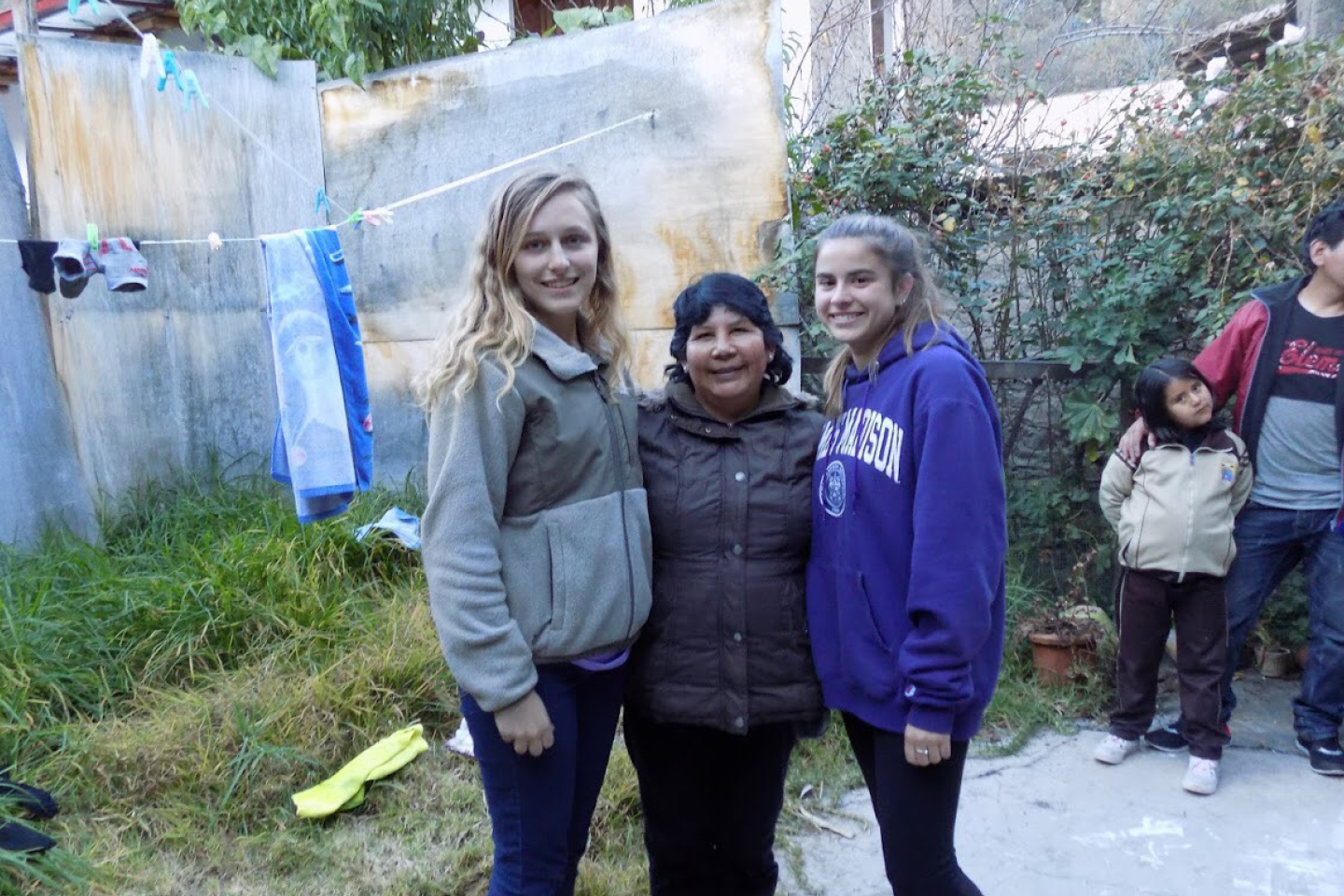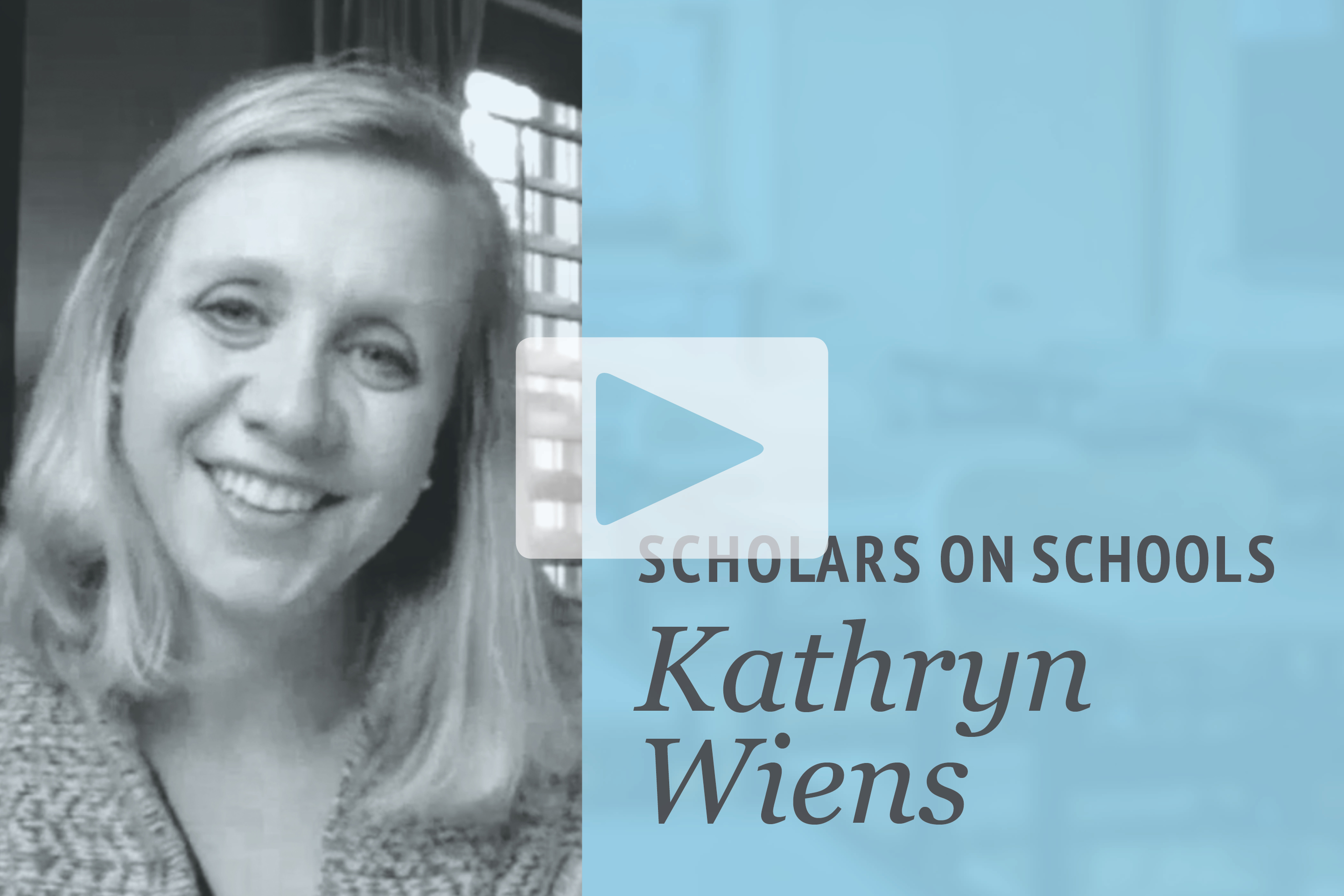For 15 years, Cape Henry Collegiate School in Virginia Beach has sent students all over the world in pursuit of character formation and personal growth. We ran a story last week on this ambitious travel program, Nexus Global Studies. Today, we feature interviews with three participating students. While their destinations differed, they all experienced a common benefit of immersive travel: insight into their own culture, its values, and its effect on them.
Fiona Clunan
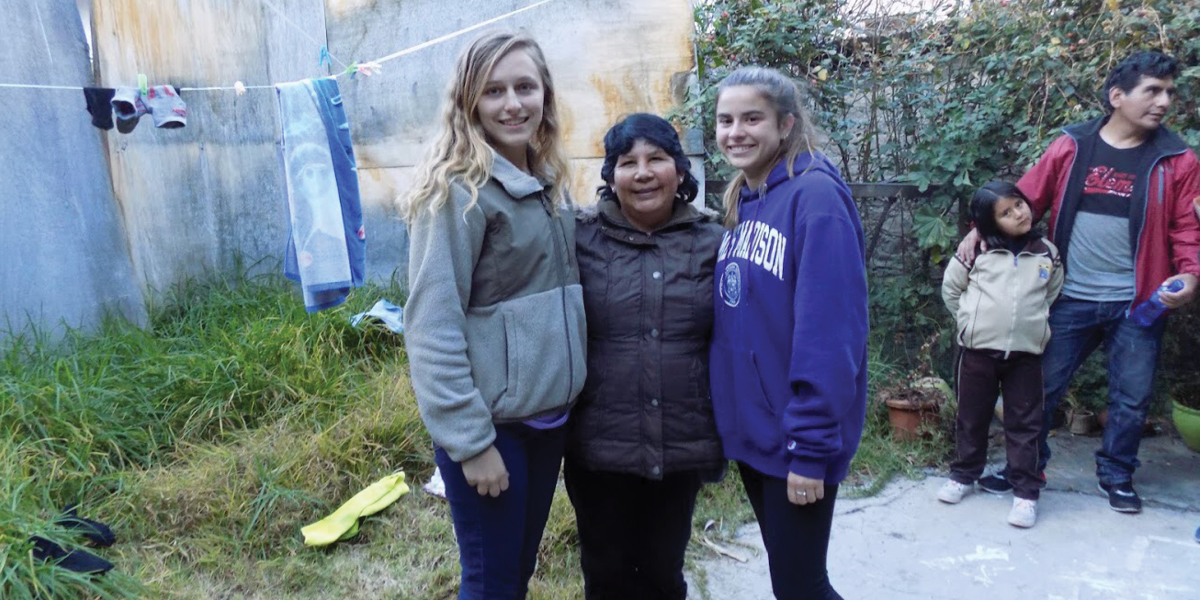
Fiona Clunan (left) with her host mom and a friend in Ollantaytambo, Peru.
Fiona Clunan graduated from Cape Henry Collegiate this past spring, and after a gap year, she will attend Stanford University in the fall of 2020. Clunan had already participated in two domestic Nexus trips—one to New York City, another to Atlanta—when she traveled with Nexus to Peru last summer. In Peru, she and her team lived with local families in two different locations and helped renovate a center for entrepreneurial women in a high-altitude village. They also biked and ziplined in the mountains.
On the difference between her expectations and reality
“It was not the easy paint-a-mural work I thought we’d do. We were mixing and pouring cement. We were laying stones. One day, we walked up a mountain, used sickles to cut hay, and brought it back on our backs. It was 40 degrees and raining. We had to carry a bunch of trees that had been cut down. We got to experience how they lived in their daily challenges.
“It was not what I was expecting—but it worked out. I expected to see Machu Picchu, use my Spanish, get a taste of the food. It was definitely much more intimate than that. The conditions were hard to adjust to in the high-altitude village, and the sustenance wasn’t very filling. It was hard to be working all day in those conditions, but I really enjoyed getting to know their culture.”
On the value of interdependence
“I learned the most in the high-altitude village. When we first arrived, we learned that the core value of the community is the Quechua word ‘ayni.’ The best translation of that word is ‘reciprocity.’ It means that whenever an individual needs help, the whole community will go help them.
“The communities are very tight-knit; it’s how they survive. I got to experience life in community and internalize their values—to think about their values compared to Western values. Individualism has its benefits, but they receive a lot of personal satisfaction—even if their lives are hard—they get a lot of their happiness from being reliant on each other. That came out for me and my group. We had to rely on each other to do work that was hard, which really strengthened our relationships. It made us better friends and better people.”
On how to approach travel
“Getting to know other cultures is the true benefit of travelling. Seeing the sights is wonderful, but when you travel, you should look to spend time in the local community getting to know how they live. That’s how you get the most out of it. There is sightseeing, and there is getting to really know people and places, and I have learned that the latter is more fulfilling.”
James Tyler
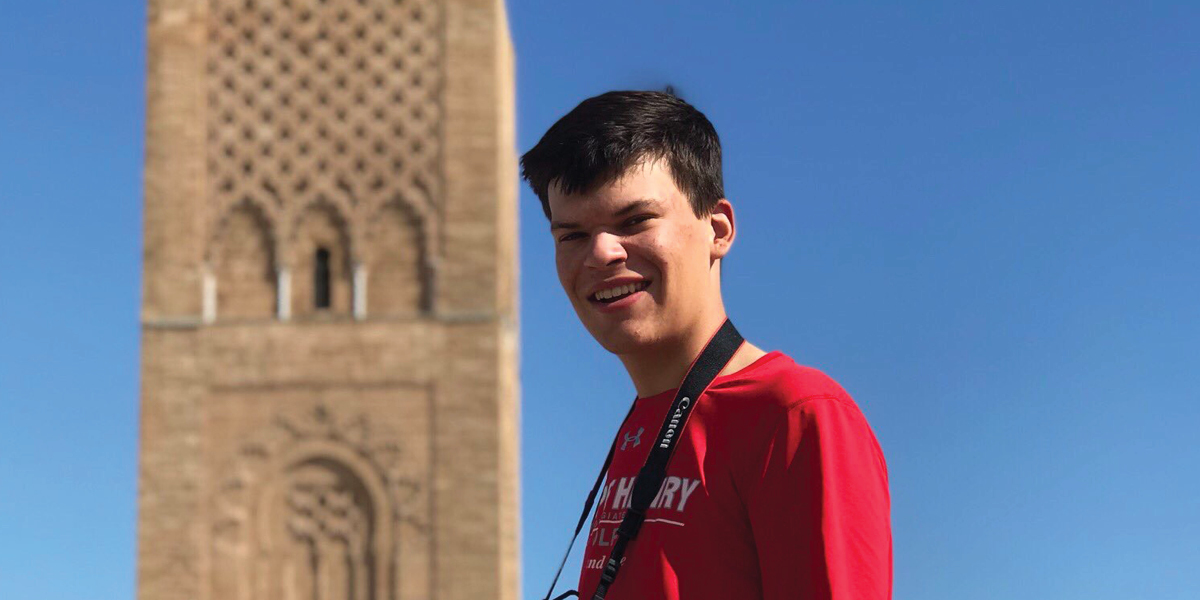
James Tyler at the King Hassan II Tower in Rabat, Morocco.
James Tyler just graduated from CHC. Through the Nexus Global Studies program, Tyler went on a 12-day trip to Norway during the spring break of his sophomore year, and he took a 17-day senior trip to Morocco after graduation. While on these journeys, Tyler attended a Norwegian school, cleaned up Moroccan hiking trails, met snake charmers in Marrakesh, and learned about the production of rosewater and carpets in Casablanca. This fall, Tyler will attend Yale University and major in math.
On cultural comparisons and insights
“We had group discussions every day about issues in Morocco and America. The goal was to build cultural understanding. In Morocco, there was a lot of interest in women’s issues and how women are treated there versus in America. There was a lot of talk about living in an Islamic culture and how strict or not strict you have to be; there was really a wide range of responses. There was a lot of talk about the king and what it’s like living in a society under a king and what people thought of him. There was also some talk about environmental issues. And they were interested in what we thought about Trump and our political situation.
“A lot of them would ask similar questions to what we asked. They’d say, ‘America isn’t perfect—you have these issues too.’ And yes, obviously America has gun issues, gender issues, race issues. They spoke good English, and they were way more informed on America than we were on Morocco.”
On the people he met during homestays
“Norway is a developed country like the US, but their society is so much more communal. There’s value placed on being equal, where in the US it’s more about individual gain. A lot of people there were content with what they had.
“In Morocco, the people seemed super happy and friendly. They weren’t anywhere as well off as we were, but they were honored to have guests and were so welcoming. We came in as total strangers, and as we were leaving, they were inviting us to come back as if we were family. It was amazing to see the impact we had on them and they had on us after just a few days.”
On cross-cultural socializing
“We [Americans, Moroccans, and Norwegians] have these cool differences in our backgrounds, but that makes it really interesting to connect. There were a lot of funny moments where you could make a joke and they would totally get it. [At other times,] you’re just speaking and don’t really understand because there’s a language barrier, and so you’re just trying to communicate in ways other than words. We were having to be nonverbal, and you end up laughing a lot, trying to make a connection. That happened a lot in Morocco, especially with older people who don’t speak as much English. People come from all different backgrounds, but we are similar in so many ways.”
On his personal highlights
“In Morocco, we drove over the Atlas Mountains out to the desert, and there we went on camels out in the Sahara Desert. We stayed the night in a camp in the Sahara, and we watched the sunset and the sunrise. It was incredible, something you never imagined you’d do.
“One other thing that was cool was that we weren’t allowed to have technology on this trip. We could have cameras, but that’s it. Not having technology was cool because you’re just together with 11 friends, having these amazing experiences and being isolated from what’s going on. You end up having these interesting conversations and moments that you wouldn’t ordinarily get.”
Grayson Bunn
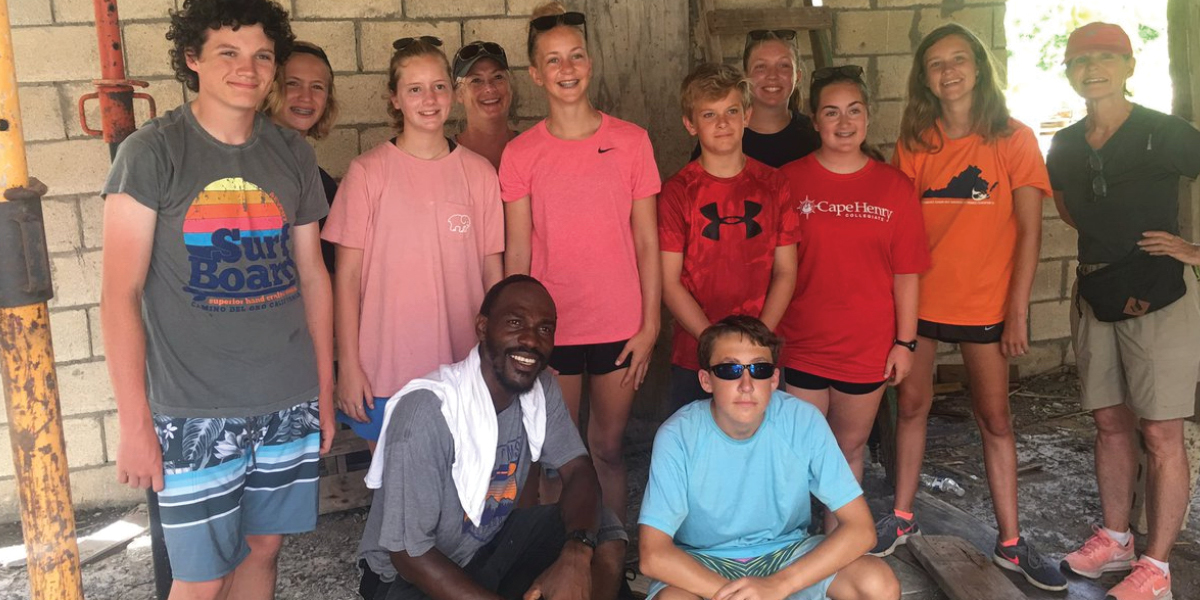
Grayson Bunn (seated in blue shirt) with his classmates and a local chicken farmer in Tortola, BVI.
Grayson Bunn is a rising ninth-grader at CHC. Last summer, he travelled with Nexus to West Virginia and Idaho on white water rafting trips. In June, he visited the British Virgin Islands for 10 days to help with cleanup from Hurricanes Irma and Maria.
On helping BVI communities rebuild after hurricanes
“We painted a church, and we went to a school where I built a guinea pig cage. We sealed structures so they wouldn’t be damaged by wind. We went to a chicken farm and cleared rubble from the home. Coy, whose farm it was, told us stories from the hurricane and what he went through. He had no power for 10 months, and then he had been working for months to restore his farm.
“My favorite project was on Anegada, a flat island where the highest elevation is 24 feet. We went to a flamingo observation deck to restore it and put sealant on it. I got to go with a group of two others to a house called the Faulkner House, which is a memorial that tourists visit. It was built with such craftsmanship; the roof has no overhang, so hurricanes can’t pick it up. But a few of the stairs were too narrow, so we took them out and built wider steps. It was my favorite because we got to see a house which was built with such attention to detail. And we were all proud of the work we accomplished.”
On what he learned from visiting another country
“We got to talk to locals, live their lifestyle, see what they were going through. We hung out with kids. Immersing myself in another culture was an amazing experience. It taught me skills in construction, but more, it taught me how lucky I am to have been there. Even though there is devastation on the island, they weren’t very affected by the disarray. They were happy and content people. They have adapted, and they seem thankful for what they have.”
On traveling outside your ‘bubble’
“Doing it can give you experiences you can’t have here. I think it develops a change in perspective. When I got home, I felt more independent. My parents said there was a change in me.
“It’s perspective-changing to see other cultures and compare them to how you’re living. While you can learn things through a textbook, actually being there, hands on, living their lifestyle, really helps you to understand the world instead of the bubble you’re currently in.”
